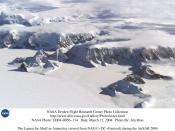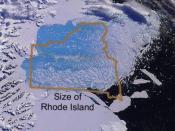In less than 4 years Tokyo, the world's largest city, will reach a staggering 27 million people. San Paolo, Brazil will reach almost 20 million, and Mexico City will reach 19 million. Sixteen other cities world wide are expected to exceed 10 million inhabitants. The planet is undergoing rapid urbanization, more then half the world's population will reside in heavily urbanized cities by 2007. Massive industrialized cities are not the only major human impact on our planet. The World Book Atlas also estimates that 90,000 square kilometers of forest, an area the size of the British Isles, is being lost each year. Tragically, the greatest impact to the world has come through global warming as a direct result of growing population masses. The availability of digital satellite images, which can be compared year by year, has revealed with shocking clarity the shrinkage of ice fields and the evaporation of large bodies of water.
"We are seeing things that you would not have seen 10 or even 15 years ago, changes that we can see by overlaying versions of our satellite images," said Sheena Barclay, the atlas's chief cartographer. "And we are seeing a lot of concerning things. "The Aral Sea in Kazakhstan and Uzbekistan, once the world's fourth largest lake, is now only the tenth largest". Since 1975, the surface of the Dead Sea has dropped by 17 meters. Perhaps the most provoking indication of global climatic change (which is occurring, whether it's caused by humans or not) became apparent during the preparation of this years current revised maps for navigation, when cartographers had to redraw the coastline of Antarctica after the Larsen Ice Shelf disintegrated last year. Humans have destroyed more than 30 per cent of the natural world since 1970 (including forest, freshwater and marine ecosystems) and Carbon...



OK.
Your paper was ok. It has lots of facts about overpopulation but you didnt offer any way for it to get better, a solution. if you added a solution i think this paper would be great. You have good ideas just go from there.
1 out of 1 people found this comment useful.